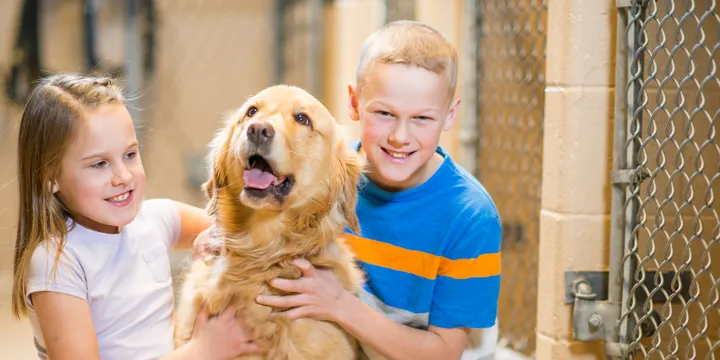
Pros and cons of adopting puppies and adult dogs

Thinking about adding a dog to your family, but not sure whether to go for a playful puppy or an adult dog?
If so, you are not the only one. It's a big decision and there are certainly pros and cons to consider for both options. Let's discuss it briefly.
Adoption of a puppy

The benefits
- Control socialization and training: One of the greatest benefits of adopting a puppy is the ability to shape their behavior from the beginning. You can make sure they have positive social experiences and learn good manners early on.
- Opportunity to bond: When you adopt a puppy, you can build a strong bond with them from day one. There is something special about experiencing all their first things together.

- Fun and playful company: Who can resist those cute and adorable antics of a puppy? Puppies bring joy and liveliness to any home.
- Magnet for attention: Let's face it, puppies are attention seekers. You'll probably make new friends because people want to pet your cute puppy.

- Energetic but short-lived high energy: Yes, puppies have endless energy, but it usually diminishes as they mature over the first few years.
- Longer time together: If you adopt a puppy, you can enjoy your companionship longer than if you adopt an older dog.
The disadvantages
- Risk of unwanted behavior: Without proper socialization and training, puppies can develop unwanted behaviors such as chewing, excessive barking and jumping.
- Household hassles: Be prepared for some accidents and the constant vigilance required for potty training.
- Chew on everything: Your shoes, the furniture, even those brand new headphones - nothing is safe from the jaws of a teething puppy.
- Need for exercise and stimulation: Puppies have lots of energy and need lots of exercise and mental stimulation to stay happy and healthy.
- Lack of manners: From nibbling fingers to pulling on the leash, puppies have a laundry list of behaviors that need to be taught and corrected.
- Uncertainty about adult appearance: Mixed-breed puppies in particular can be a bit of a mystery when it comes to predicting their adult size and appearance.
Adoption of adult dogs

The benefits
- Already housebroken: One of the main advantages of adopting an adult dog is bypassing the challenges of housebreaking. Many adult dogs are already housebroken, saving you the time and effort of teaching them where to do their needs.
- Done teething: say goodbye to chewed-up furniture - adult dogs don't usually have the same habits as puppies.
- Basic Training Knowledge: Most adult dogs already know basic techniques such as sit, stay and ways to walk on a leash, making them easier to integrate into your household.

- Well-socialized: Adult dogs are usually comfortable with different people and situations, thanks to their previous life experiences. Whether you're hosting a barbecue in the backyard or taking a walk around the neighborhood, you can count on your adult dog to handle social interactions with ease.
- More relaxed: Unlike their puppy counterparts, adult dogs are more relaxed and less prone to bouts of hyperactivity. They enjoy lazing around the house as much as walking or fetching in the garden.
- The end of adolescence approaches: Although they may still have some energy left to burn, adult dogs are usually past the tumultuous adolescent phase. With proper outlets for their energy, they are content with a quieter, more predictable routine.
- Gratitude and bonding: Many adult dogs rescued from shelters seem to understand that they have been given a second chance and form deep bonds with their new owners.
The disadvantages
- Potential behavioral problems: Adult dogs may have some baggage from their past experiences. They may exhibit behavior problems such as guarding sources, separation anxiety or reactivity on the leash that require patience and understanding to address.
- Bad habits: Some adult dogs may have picked up bad habits in their previous home, which requires patience and consistency to overcome.
- Long adjustment period: It can take a while for adult dogs to feel at home in their new environment and bond with their new family. Some dogs may experience anxiety or stress during this transition period and need patience and reassurance from their adopters.
- Difficult bonding: Dogs that have experienced trauma or neglect in the past may have difficulty trusting people again. Building a strong bond with these dogs can take extra time, patience and empathy to help them feel safe and secure.
- Limited lifespan: Larger breeds in particular may have a shorter lifespan than smaller dogs. If you adopt an adult dog, you may have fewer years together than if you had chosen a younger puppy. It is essential to cherish the time you have and make the most of every moment together.
In conclusion
So, those are the pros and cons of adopting a puppy or an adult dog. Ultimately, the right choice depends on your lifestyle, preferences and willingness to put time and effort into training and caring for your new friend. Whether you choose a small puppy or a wise old dog, one thing is certain - you will gain a loyal companion and a lot of love.
About the Author

Kelly was born and raised in the city of Worcester, MA, and has always had a great love for dogs. Her parents, now retired, both worked as veterinarians when she was growing up, which sparked her interest in animal care early on.





